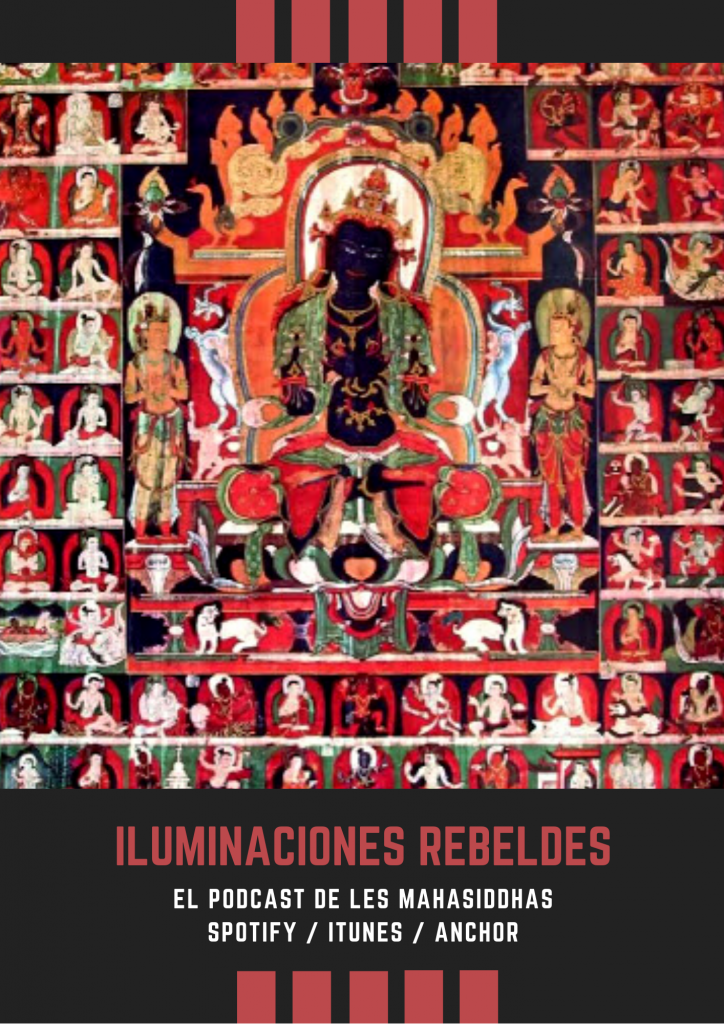
Hi! My name is Fede Andino, and I’m, at work, a Culture Crafter. But outside work, I am also a University Professor and Researcher, as well as a Buddhist Teacher. One particular thing that I love to teach is the story of the 84 Mahasiddhas: a group of bizarre, funny, disruptive hindu and buddhist practitioners who broke down assumptions and inagurated a new style of practice: tantric buddhism and hinduism (which, to be honest, has nothing to do with the sex-obsessed new tantra taught in the west).
Usualy, since it’s a big story, composed of 84 mini-chapters or stories, it tends to be taught (by other and myself) in one of two ways: as a multi-day teaching, usually in a retreat setting or in an abbreviated, written form. I wanted to bring this story, which is funny, warm and profundly humane, in a more relaxed setting; the kind of thing that I would love to hear in this never-ending quarantine. Thus, I started a podcast this year.
Yesterday, Sep.17 I finished the Podcast. It was, surprisingly, kinda a hit in the spanish-speaking countries (let’s be honest: it’s also quite niche, so that helped) averganging 453 views per chapter (the most listened chapter has the record of plays at 4.112 at the time of writing). The audience started low (near 10 people per chapter) and climbed to stability (1.391, with people listening from Argentina to Mali). This, of course, is small potatoes to really big Podcasts (not even compared to Joe Rogan; the most listened Podcasts in Argentina averange between ten times that volume) but, for someone who was doing his first attempt…it was surprisingly solid, at least to me. This was enough to Anchor (my publishing tool) to offer me a paid sponsorship program; Alas, living in Argentina I cannot access it, but it was a nice touch.
Having completed my goals, the feedback that I’ve got tells me that I will probably create another in a couple of months; meanwhile, I’ll also upload one-shots for requested Mahasiddhas which are not in the general list.
What I’ve learned? Well, a bunch of things:
- First, I read some books and courses for Podcasting. Bar none, the most useful in my opinion is Amanda Mayo’s Podcasting (https://www.amazon.com/Podcasting-Podcast-Create-Profitable-Business-ebook/dp/B082KZYNBB) – a very useful how-to guide, from idea to podcast
- The main investing should be geared towards a good microphone: the quality, from a simple headset mike to a Yeti condenser was incredible (https://www.bluemic.com/en-us/products/yeti/)
- Audio mixing: I used Audacity quite successfully; you don’t need expensive software for a podcast.
- Niche is king: as much as you can laser-focus your podcast, you’ll reap benefits in the same amount
- On a not-so known path: there’s a lot of discussion here in Argentina, in academic circles, about the use of gender-inclusive language. The main consensus is that it helps visibilize inequalities, but it is a hot-topic for conservatives. I received a lot (I mean a lot) of well-meant “advice” on the topic, that I should not include it in order to broaden my reach. While I respect the “advice” (and the insults/threats from more overtly concerned people) I think that a very important differentiatior is the authenticity of your voice: since I use it in daily talk I included, which helped solidify loyalty and build the audience
- When I started, I tended to do one story per episode. But since stories vary a lot in content (some are long and detailed, some you can tell in two minutes) I wrestled with adapting the format a quarter of a way in. I finally adapted (thinking the Agile way) and was rewarded by a climb in audience
So, to recap my Lessons Learned: Be niche, invest in a good mike, be authentic and agile.
Is there any other thing that you might think it helps? I would love to learn, if that’s the case
F
PS: If you’re curious about it, I’ve made a Spotify list with the episodes. Warning: it is Spanish only.

Please note: I reserve the right to delete comments that are offensive or off-topic.